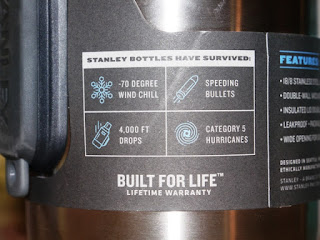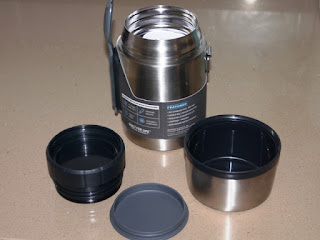With the Summer fire bans now in place in Spain I've been pondering ways in which I can still have a good meal while out and about without falling foul of the law and/or risking setting the countryside on fire.
While it could be reasoned that the semi-concealed nature of my Jetboil Zip's flame means it doesn't constitute an "open flame" - and indeed it seems other countries do allow the use of such stoves during fire bans - I decided I didn't want to take the gamble on it being OK. So I started looking into flameless cook systems, but of the few I found to exist, most had been discontinued without replacement which made me question their effectiveness and/or safety. This left me at somewhat of a dead end. Then I realised maybe I was over-thinking the issue.
As I tend to only do over-night camps due to time constraints, I started wondering whether I even need to cook at all. I mean nothing beats the simple pleasure of cooking up a meal in the wilderness, but how essential is it on a one-night stay? Not essential at all, I reasoned, so I started looking at vacuum food jars (basically vacuum flasks but shorter and wider, specifically designed for storing and consuming food from).
There are several reputable offerings, all in a similar price range, from the likes of Thermos, Esbit and Stanley, and even more offerings from some lesser-known brands. I decided to stick to a big name on this and even then it was a tough decision - there are almost too many different options:
Stanley do several different sizes, including a 400ml and 530ml version (both including a spork); Thermos do two models that fit between the two Stanley offerings in terms of size, at 470ml (which is cheaper and only marginally heavier (40g) than the smaller Stanley model), and 500ml (at the same weight as the Stanley but more expensive), both including a spork. Esbit do a 750ml model at around the same weight (and price) as the larger Stanley model, and then Thermos do a 710ml version which at 400g weighs in considerably less than both the Esbit and the larger Stanley, but neither include a spork. In fact it was so difficult to chose that in an ideal world I would have bought one of each.
I decided the 400ml Stanley was too small, given that it would hold a can of chilli but nothing else (i.e. no rice), and I thought the 470ml Thermos might also be a bit on the small size for the same reason. Initially the Esbit, with an extra 50% capacity yet same overall weight as the larger Stanley, or the lighter but more capacious 710ml Thermos seemed to be the most viable options, but then I reasoned that unless I filled them, they would be less effective at doing their job of keeping the food warm; with that said I'm strongly considering purchasing one of these at a later date for when the wife and I next camp, as at that size it will hold enough food for two - albeit slightly smaller - portions. Ultimately, the 530ml Stanley seemed to be the ideal compromise between capacity and weight.
The Stanley jar arrived with virtually no packaging of it's own (a good thing), save for a cardboard wrap upon which it mentions that Stanley flasks have survived speeding bullets, 4000-foot drops, etc; not Amazon's couriers though, being as it arrived with a massive dent in the lid. I have that many problems with Amazon deliveries that I decided just to keep it, rather than mess around with a replacement - given that it's the lid rather than the flask that is dented it shouldn't effect functionality.
Bulletproof......
....but not Amazon/courier proof.
As the product name suggests, it really is an all-in-one system; the lid, as anyone who's ever owned a flask will know, acts as a bowl. In this case it is a stainless steel outer with a plastic liner, giving an element of insulation to prevent burnt hands. With that said, the mouth of the jar is wide enough to eat straight out of and it's more likely I will use the lid as a cup, if at all.
The top of the stopper has it's own little compartment with lid to store - well, I'm not sure what you would put in there, but it's there anyway. Attached to the side of the jar is a spork holder and spork. I intended to replace the included spork with my titanium Sea To Summit version on the presumption that the latter would be lighter, but it actually isn't. And just as well, because it doesn't fit the holder.
Despite the courier's best efforts, the jar does feel solid and built-to-last and it's easy to see why Stanley offer a lifetime warranty. With no other brand's offering's to hand I can't make comparisons, but I have absolutely no complaints from a build perspective.
At 520g, the jar comes in a shade under the weight of my Jetboil plus gas canister, and weighs less than my spirit stove excluding fuel. So for a single-person, single-night trip it actually makes more sense to take the jar unless I was using dehydrated food and near a water source* (in which case the Jetboil would become the lighter option overall), and it also presents other benefits; if for whatever reason you found yourself unable to cook (bad weather, as one example), with this you've already got your cooked meal, ready to eat. I'm amazed it's taken me this long to think about it to be honest.
With that said, there is of course one major down-side; food will only stay hot for so long. Stanley claim 12 hours, though some real-world reviews disagree. I've yet to test this out - if the food is still hot after 12 hours then there is no issue for one-night trips. If, in fact, it starts to get cold after 6 hours, that could be a problem. Time will tell on that front, and I'll be sure to report back with my findings.
*The dry weight of dehydrated food plus the weight of the water needed to activate it is generally more than the food weight of a can of chilli, soup, etc; dehydrated food is really only meant for long trips where a lot of food needs to be carried and access to water is plentiful - there's certainly no argument for using dehydrated food on one or two-night trips.




No comments:
Post a Comment